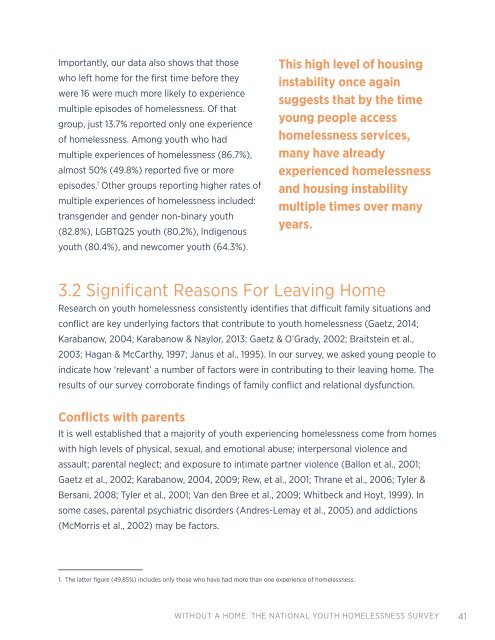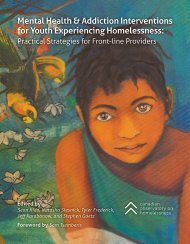Without A Home: The National Youth Homelessness Survey
Create successful ePaper yourself
Turn your PDF publications into a flip-book with our unique Google optimized e-Paper software.
Importantly, our data also shows that those<br />
who left home for the first time before they<br />
were 16 were much more likely to experience<br />
multiple episodes of homelessness. Of that<br />
group, just 13.7% reported only one experience<br />
of homelessness. Among youth who had<br />
multiple experiences of homelessness (86.7%),<br />
almost 50% (49.8%) reported five or more<br />
episodes. 1 Other groups reporting higher rates of<br />
multiple experiences of homelessness included:<br />
transgender and gender non-binary youth<br />
(82.8%), LGBTQ2S youth (80.2%), Indigenous<br />
youth (80.4%), and newcomer youth (64.3%).<br />
This high level of housing<br />
instability once again<br />
suggests that by the time<br />
young people access<br />
homelessness services,<br />
many have already<br />
experienced homelessness<br />
and housing instability<br />
multiple times over many<br />
years.<br />
3.2 Significant Reasons For Leaving <strong>Home</strong><br />
Research on youth homelessness consistently identifies that difficult family situations and<br />
conflict are key underlying factors that contribute to youth homelessness (Gaetz, 2014;<br />
Karabanow, 2004; Karabanow & Naylor, 2013; Gaetz & O’Grady, 2002; Braitstein et al.,<br />
2003; Hagan & McCarthy, 1997; Janus et al., 1995). In our survey, we asked young people to<br />
indicate how ‘relevant’ a number of factors were in contributing to their leaving home. <strong>The</strong><br />
results of our survey corroborate findings of family conflict and relational dysfunction.<br />
Conflicts with parents<br />
It is well established that a majority of youth experiencing homelessness come from homes<br />
with high levels of physical, sexual, and emotional abuse; interpersonal violence and<br />
assault; parental neglect; and exposure to intimate partner violence (Ballon et al., 2001;<br />
Gaetz et al., 2002; Karabanow, 2004, 2009; Rew, et al., 2001; Thrane et al., 2006; Tyler &<br />
Bersani, 2008; Tyler et al., 2001; Van den Bree et al., 2009; Whitbeck and Hoyt, 1999). In<br />
some cases, parental psychiatric disorders (Andres-Lemay et al., 2005) and addictions<br />
(McMorris et al., 2002) may be factors.<br />
1. <strong>The</strong> latter figure (49.85%) includes only those who have had more than one experience of homelessness.<br />
WITHOUT A HOME: THE NATIONAL YOUTH HOMELESSNESS SURVEY<br />
41

















